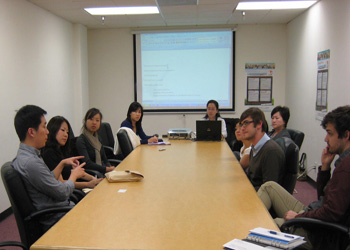 By Ann Lee___12/3/10 – U.S. President Barack Obama, Oprah Winfrey, U.S. General David Petraeus, and Bill Gates are faces of leadership in our world today, but often unrecognized as examples of leadership are teachers, parents, military troops, community volunteers, and yes, students.
By Ann Lee___12/3/10 – U.S. President Barack Obama, Oprah Winfrey, U.S. General David Petraeus, and Bill Gates are faces of leadership in our world today, but often unrecognized as examples of leadership are teachers, parents, military troops, community volunteers, and yes, students.
“I think we all have it in us and we just don’t know it,” Steve Kim, a teacher at the learning center, Score Rite, said. “It could look different; it could look like simply loving one another or it can look like taking charge, but it’s something we all have.”
Kim was one of a dozen teachers, learning center directors, and developers of the curriculum, “Leadership Prep,” who gathered at The Korea Daily on December 2, 2010, to discuss effective leadership development and education with Dr. Yoojin Choi, a teacher at the prestigious boarding school, Philips Exeter Academy, in Massachusetts.
“The given idea is that every single time a student walks into a classroom at Exeter, he or she is ready to take charge of his or her own learning at the table and contribute and be the person who helps the other student who doesn’t really understand [the material], help the person along and also benefit by having to talk about it in their own words,” Dr. Choi said.
She was explaining the Harkness Table, which is the basic idea that learning is most developed through engagement and participation, rather than a one-way channel of sending and receiving information.
To demonstrate this, Dr. Choi turned the tables on the attendees at the seminar by turning a simple time of self-introduction into a lesson.
“Did you notice that when you weren’t introducing yourself, only the person who was talking was looking at me? Did you catch everyone’s names? Did you catch where everyone works? Why they’re here?” she asked. “It wasn’t your task to learn any of that, but that’s really the beginning of what ‘Harkness’ is all about: student engagement, participant-thinking, everyone being a leader at the table.”
As some teachers shared their passion for drawing out leadership potential in each of their students, they exchanged how they’ve been doing this, why they’re passionate about leadership, and some challenges they face with students and parents.
“The thing that I struggled with the most was the cultural bias of the [Leadership Prep] program,” Suzy Lim, a teacher and developer of the curriculum, said. “Because if you think about it, it teaches us to do everything we were taught not to do.”
Lim was referring to the wide cultural divide between Western and Eastern culture that creates confusion for Asian immigrant students in America and handicaps their potential for leadership.
For example, in Korean culture, it is disrespectful to look directly into someone’s eyes, especially if a student is being reprimanded by a parent, but in American culture, direct eye contact demonstrates respect in the form of listening, focus, and engagement. It is also a sign of disrespect in Korean culture, to kindly disagree, rather than simply obey.
“That’s something that my students in fifth grade, sixth grade, struggle with and I always have to encourage them and say, ‘It’s okay, you can completely disagree and you’re not wrong,” Lim said. “It’s a shame if you just keep your mouth shut and you’re not sharing, and you’re doing your teammates a [disservice].”
She also shared the challenge in helping immigrant parents see the disservice to their own children if they only focus on the raw grades and numbers as indicators of success. When she asked a parent how much he would pay if he knew it would guarantee a 4.0 GPA for his daughter, he said he would give up every penny he had yet when she asked how much he would pay for her to gain leadership, communication, and critical thinking development, he hesitated to answer.
Esther Oh, director of the learning center, Score Rite in Fullerton, agreed that Korean parents have a passion for academic achievement, but lack the long-term vision of a child’s happiness. Acceptance at a good college is not the end goal, she said.
Will the student get a good job and be happy in it? Will she be able to find this kind of job? Will he be able to keep it? Is the student going to become someone other people love to be around? Will other people want to connect with and be friends with her? Will an employer see potential in him to want to promote him? Will she know how to get promoted? Will he become someone who matters to other people and to society? Will people want to be like him or will other people look up to her some day?
Many immigrant parents express heartfelt desire for their children to be happy, but their definition of happiness is often too narrow. To these parents whose selfless hope that their children will have a life experience better than their own, Dr. Choi explains that learning through the Harkness table, which is incorporated in “Leadership Prep” will help broaden their opportunities.
“This is how we’re going to make sure that your kids get something different from your experience and make sure that our smart kids don’t only stay book-smart, but [also] gain this other set of skills that is so important in this society,” she said. “They have all this knowledge, but because of cultural differences and language barrier, they haven’t been able to make more of themselves in mainstream society.”
In addition to the seminar, Dr. Choi presented another session that same night, attended by 150 parents and educators at Los Angeles Korean Baptist Church.


